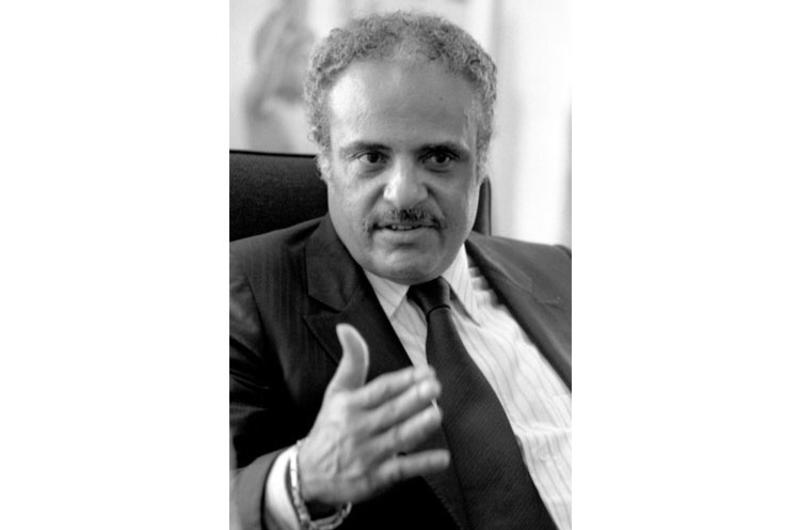

This website was created and maintained from May 2020 to May 2021 to commemorate the 75th anniversary of Stars and Stripes operations in the Pacific.
It will no longer be updated, but we encourage you to explore the site and view content we felt best illustrated Stars and Stripes' continued support of the Pacific theater since 1945.
Dr. Benjamin Hooks: Reaganomics could lead to violence

Dr. Benjamin Hooks in Tokyo in May, 1982.
By HAL DRAKE | Stars and Stripes June 5, 1982
TOKYO — The executive director of one of the most conservative civil rights organizations — Benjamin Hooks of the NAACP — says President Reagan's domestic policies have been such a disaster that it wouldn't surprise him if they touched off rebellion in the streets of the United States.
"Violence is endemic in America — it always has been," Hooks said. "In a violent country, with some eight million people out of work, I wouldn't be surprised at what they'd do. We might have a revolution. I wouldn't be surprised.
"The only thing I want to say to the president is: Don't put all the National Guard in the black communities, because the riots may not start there."
Hooks, whose remarks about possible rebellion are surprising in light of the NAACP's reputation for measured, carefully weighed comment on issues affecting blacks, said his lack of confidence in Reagan has been justified by everything the former California governor has done since becoming president.
"I think he's a disaster for the country," Hooks said. "And since black people are part of the country, it's a disaster for us."
He said Reagan's domestic program, which Hooks feels is symbolized by drastic cuts in social welfare programs, deprives the poor, needy and disabled of a "safety net" without doing anything to reduce the federal deficit.
"And the most unwise, unfair economic policy that America has had in its 200-year history has been the tax cut Mr. Reagan has pushed through Congress," added Hooks, who charged that most of it benefits a wealthy 6 percent of the population, trimming very little from the tax load of blacks and lower-income families.
"It's just unfair — it's a reverse Robin Hood, stealing from the poor and giving to the rich," he said.
Hooks visited Japan briefly as the guest of the United States-Japan Foundation. He conferred with U.S. Ambassador Mike Mansfield and Japanese industrialists on the trade imbalance, particularly in automobiles, that he said could cost thousands of black autoworkers their jobs.
However, he warned against "scapegoating" Japan, West Germany or other strong competitors with the United States.
"(They're not) responsible for 18 percent (American) interest (rates) and chronic unemployment and a trillion-dollar deficit," Hooks said. Reaganomics is, he charged.
In the area of civil rights, Hooks said, Reagan has "gone backwards" by "granting tax-exempt status to schools that segregate or changing the rules for federal compliance, rolling back on affirmative action, being in favor of no school busing, trying to strip the courts of power."
Hooks slammed into Reagan hardest for "campaigning for 20 years on balancing the budget, and he presides over the largest peacetime deficit in history."
Turning to the subject of his own organization, Hooks said the NAACP will stick to the formula that has helped it obtain its big successes during its 73-year history — patient chipping away at racial barriers and discriminatory practices. He scoffed at suggestions that black militants of the 1960s gained ground through force or riot.
"The question is: They put on the black glove, what do they do?" Hooks asked. "Where are they now? The NAACP still exists, they're getting the job done.
"I came out of World War II, and there's no need for me talking to young black kids about it because they don't want to hear about it and they're not going to pay any attention to it."
Hooks related that he was in the 92nd Infantry Division, an all-black unit with white officers. Several times, the 92nd fought beside the 442nd Regimental Combat Team, an all-Japanese-American outfit, many of whose volunteers had been persecuted in the United States after the Japanese attack on Pearl Harbor.
"It was the NAACP that broke it (racial barriers in the military) down, so that now we have a black general here (Lt. Gen. Roscoe Robinson Jr., commander of U.S. Army Japan)," Hooks said.
"But what the hell does that mean to the kids? I mean, we haven't taught it and they haven't learned it.
"It wasn't putting on a glove and raising a damned fist that changed the thing. It was steady, persistent pounding on the Congress."
Hooks noted that even blacks in uniform turned away from the NAACP during the Indochina War years, though he said they — like their civilian counterparts — were beneficiaries of what the organization had accomplished over the years.
"And the clenched fist and H. Rap Brown were about as relevant as ... Where is Bobby Seale now? What has he done? Go back and read the history and see what can be a tribute to him."


